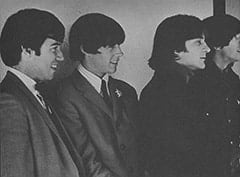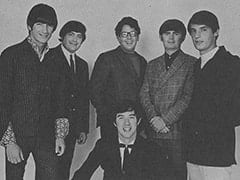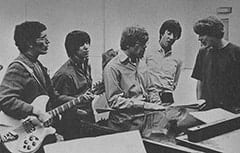
By Laurayne
This is the first (and maybe the last) interview our very own resident teenybopper, Laurayne, was allowed to conduct. That is, we let her ask the questions. They were carefully typed on large flash cards, held up by TeenSet’s editor. The first card said, “Hi, I’m Laurayne, TeenSet’s resident teenybopper.” From there, it got worse.
If you read Hollywood Underground carefully every month (and if you don’t why not?), you noticed a small item about one Chip Douglas (the only Chip Douglas, as far as I know) becoming the producer for Monkees recordings. Also, a small wishful-thinking statement about… “maybe I can interview him…” Well, Hollywood is known as the town where dreams come true (just ask the Walker Brothers, P.J. Proby, and Them), so you are about to read the true life account of an interview with Chip Douglas by one very timid, shy, unassuming teenybopper… me…?
But before you read about the actual happenings of that encounter, perhaps you would like to know why we think Chip deserves to be written about. (Perhaps not, if you have already looked at the pictures.) Well, Mr. Douglas has indeed been assigned the somewhat enormous task of producing recording sessions for the somewhat fantastic quartet known as the Monkees. Therefore, you will be reading his name on record labels and jackets, hearing his name from the kissable lips (sorry about this, chief) of Monkees themselves, and listening to songs both written and produced by Chip, if you haven’t already done so.
When I found Chip for our interview, he was on the telephone (an uncomfortable position, yes) but motioned for me to sit down. (It gets better, I promise.)
My first question was, “Mr. Douglas, could you please explain your recent retirement from the Turtles? We are already getting letters from fans saying that we are all a bunch of liars because we printed that you were still with the group.”
“I really regretted leaving the group. I didn’t want to at all, but I found that they were getting very busy with ‘Happy Together’ being a hit. I knew I couldn’t go on the road and still accept the producing jobs I’ve been offered.”
“Why did the Monkees choose you… had they heard your work before?”
“Peter, Davy and Mike were fans of the MFQ (a folk quartet with which Chip used to play bass, and which he now produces… more about that later). They wanted to find someone like them, a musician who would understand what they want to do. They want to play their own instruments and wanted a producer who was a musician, who knows music.”

You might well be asking yourself at this very moment, “And why does Chip Douglas qualify as ‘a musician who would understand what they want to do… a musician who knows music’?” And well you might. I’d like to thank you for asking yourself that question. It will give me an easy lead-in to the background, both musical and personal, of our interviewee. (That’s Chip.)
Douglas Farthing Hatlelid was born in San Francisco on August 27, 1942. What does Douglas Farthing Hatlelid have to do with Chip Douglas? Another timely question. DFH is Chip Douglas. One may assume from the pseudonym that Chip did not like his middle and last name, but was a chip off the old block and didn’t mind the name Douglas. One may be wrong.
Aforementioned block, Mr. Hatlelid, was a doctor on a large sugar plantation in Hawaii, where the Hatlelid family still resides. After about 1 ½ years at the University of Hawaii, Chip entered the music field permanently. Before entering college, he had tried his luck with a folk trio, the Wilcox Trio, which was patterned after the Kingston Trio. An album by the group was the only product of a trip to California. “I wish I had a copy. It’s like a collector’s item now.”
“While I was at the University of Hawaii, I played the lead in ‘West Side Story,’ at the Honolulu Community Theatre. I did that for about eight weeks. Meanwhile, a friend of mine, Tad Diltz, started singing with the Wilcox Trio, and I felt kinda left out. They were playing at Dolan’s Steak House. After a while, the other two guys went back to school, which left Tad and me.
“We got together with a guy named Cyrus Faryar, who had a coffee house in Honolulu about the time the Wilcox Trio was going in high school. We used to get together at Cyrus’ coffee house, singing. The three of us formed a trio and came to the west coast where we met Jerry Yester and formed a quartet. We performed for three and a half years as the MFQ. Then, we all began to get interested in other things: Tad in photography, Jerry in producing and arranging (which he now does for the Association). I wasn’t the slightest bit interested in producing at the time, so we split for a while. That’s when I got with Gene Clark.”
The Gene Clark Group lasted only a few months, performing at local clubs. “Gene felt something wasnt’ [sic] right with the group so we broke it up. About two days after that, I joined the Turtles. They called me from somewhere in the East where they were on tour.

“I arranged ‘Happy Together’ and wrote all the brass parts. I read and write music… Judy Henske’s next single will be ‘Day To Day,’ which I wrote. The MFQ (now strictly a recording group) are doing one of my tunes, and the Monkees will eventually get to one thing of mine.”
Chip Douglas is a producer, writer and musician. He has done folk and folk rock (MFQ), rock and roll (Turtles), he played bass on a Fred Neil album… he has had good and bad times with his music.
The Monkees have done folk (Peter and Mike), rock and roll (obviously) and have had their ups and downs with their music.
Now, both Chip Douglas and the Monkees are headed in the direction in which they want to be headed… playing the music they want to play, playing their own instruments, working with people who know what they want… and they are going it together.
“My secret ambition is to build a gyrocopter, which is a one-man helicopter with a free-wheeling propeller. It’s a cross between an airplane and a helicopter. They have kits with everything, or you can…”
As I left the room, I took one last longing look at the tall, dark, good looking bachelor seated behind the desk. “There’s a man with a future,” I quoth to myself. And I was right.


